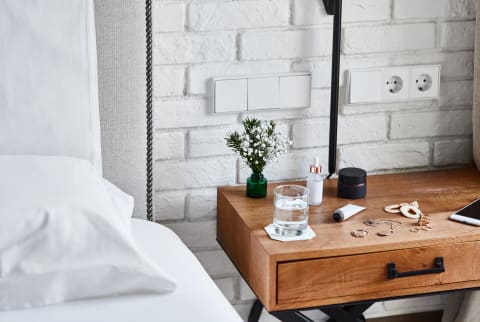Advertisement
Why This Urologist Wants You To Reconsider Keeping Water By Your Bed


Ever notice that urine color tends to be darker in the morning than it is later in the day? While that amber hue is generally a sign of suboptimal hydration, overcorrecting by guzzling water close to bedtime or keeping a cup on your nightstand for pre-snooze sipping may not be the best option.
What's so bad about drinking water before bed?
While drinking water later in the evening is not unhealthy in and of itself, waking up in the middle of the night to use the bathroom can interfere with overall sleep quality and well-being.
Lack of quality sleep can affect your immune function, according to integrative immunologist Heather Moday, M.D. While our body is resting, the immune system cells can also focus all efforts and energy on strengthening their immune response, she previously told mbg.
Poor sleep can also affect gut health, which plays a role in cognitive functioning1, immune functioning, and of course, digestion.
"In my opinion, it's not the total hours you're in bed. It's how much deep sleep and how much REM sleep you're getting," board-certified family medicine doctor Robert Rountree, M.D., once said during an episode of the mindbodygreen podcast. In other words, even if you're getting a full eight hours, waking up in the middle of the night to urinate can disrupt your sleep cycle, leaving you feeling tired the next day.
So, when should you stop drinking water?
Depending on a person's age, health status, and physical or sexual activities, the best time to stop drinking water will vary. In general, though, urologist Vannita Simma-Chiang, M.D., recommends taking your last sip of the day three to four hours before bed. (At least, that's what she does as part of her own pee health routine.)
And if you really want to ensure you're getting deep and uninterrupted rest, might we suggest taking your last sip of water alongside mbg's sleep support+ supplement?* The formula contains a science-backed trio of ingredients: magnesium bisglycinate (a highly absorbable form of magnesium) to support a steady state of relaxation, jujube to promote calm, and PharmaGABA® to enhance your natural sleep quality.* Even better? It's melatonin-free so you won't wake up feeling groggy the next day.*
While the exact time to take magnesium will vary, we recommend taking sleep support+ about one to two hours before bed.* And if you're worried about that being a couple of hours past Simma-Chiang's recommendation for when to stop drinking water, don't worry, we reckon those few extra gulps won't make much of an impact.
The takeaway.
While staying hydrated is important, drinking water too close to bedtime might wake you up for much-needed bathroom breaks. In order to stay asleep throughout the night, urologists recommend taking your last gulps of water about three to four hours before bed.
Of course, "Any time you feel thirsty or your throat is dry, it's a good idea to drink water," Simma-Chiang adds. Just try to go to the bathroom right after to avoid waking again later. And if you want to support your snoozing even further, consider taking a high-quality sleep supplement, like mbg's sleep support+.*
Watch Next
Enjoy some of our favorite clips from classes
Enjoy some of our favorite clips from classes
What Is Meditation?
Mindfulness/Spirituality | Light Watkins
Box Breathing
Mindfulness/Spirituality | Gwen Dittmar
What Breathwork Can Address
Mindfulness/Spirituality | Gwen Dittmar
The 8 Limbs of Yoga - What is Asana?
Yoga | Caley Alyssa
Two Standing Postures to Open Up Tight Hips
Yoga | Caley Alyssa
How Plants Can Optimize Athletic Performance
Nutrition | Rich Roll
What to Eat Before a Workout
Nutrition | Rich Roll
How Ayurveda Helps Us Navigate Modern Life
Nutrition | Sahara Rose
Messages About Love & Relationships
Love & Relationships | Esther Perel
Love Languages
Love & Relationships | Esther Perel
What Is Meditation?
Box Breathing
What Breathwork Can Address
The 8 Limbs of Yoga - What is Asana?
Two Standing Postures to Open Up Tight Hips
How Plants Can Optimize Athletic Performance
What to Eat Before a Workout
How Ayurveda Helps Us Navigate Modern Life
Messages About Love & Relationships
Love Languages
Advertisement

This Supplement May Remarkably Benefit Those With A High Risk Of Alzheimer’s
Molly Knudsen, M.S., RDN

Want To Be Metabolically Healthy? Study Shows An Underutilized Approach
Molly Knudsen, M.S., RDN

Don’t Eat A Lot Of Meat? Make Sure You Take This Supplement Daily
Molly Knudsen, M.S., RDN

Study Reveals 2 Habits That Are Early Signs Of Muscle Loss In Women
Molly Knudsen, M.S., RDN

This Supplement May Remarkably Benefit Those With A High Risk Of Alzheimer’s
Molly Knudsen, M.S., RDN

Want To Be Metabolically Healthy? Study Shows An Underutilized Approach
Molly Knudsen, M.S., RDN

Don’t Eat A Lot Of Meat? Make Sure You Take This Supplement Daily
Molly Knudsen, M.S., RDN

Study Reveals 2 Habits That Are Early Signs Of Muscle Loss In Women
Molly Knudsen, M.S., RDN

This Supplement May Remarkably Benefit Those With A High Risk Of Alzheimer’s
Molly Knudsen, M.S., RDN

Want To Be Metabolically Healthy? Study Shows An Underutilized Approach
Molly Knudsen, M.S., RDN

Don’t Eat A Lot Of Meat? Make Sure You Take This Supplement Daily
Molly Knudsen, M.S., RDN

Study Reveals 2 Habits That Are Early Signs Of Muscle Loss In Women
Molly Knudsen, M.S., RDN

This Supplement May Remarkably Benefit Those With A High Risk Of Alzheimer’s
Molly Knudsen, M.S., RDN

Want To Be Metabolically Healthy? Study Shows An Underutilized Approach
Molly Knudsen, M.S., RDN

Don’t Eat A Lot Of Meat? Make Sure You Take This Supplement Daily
Molly Knudsen, M.S., RDN

Study Reveals 2 Habits That Are Early Signs Of Muscle Loss In Women
Molly Knudsen, M.S., RDN











